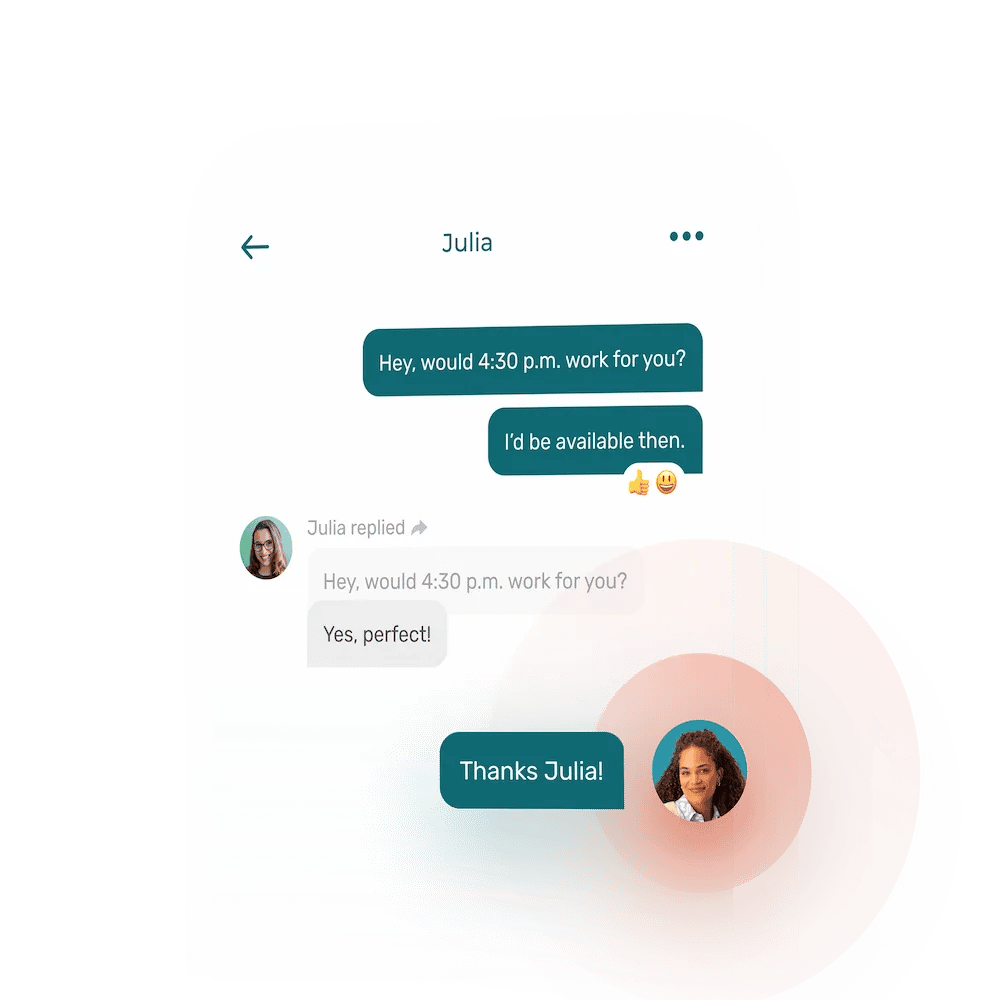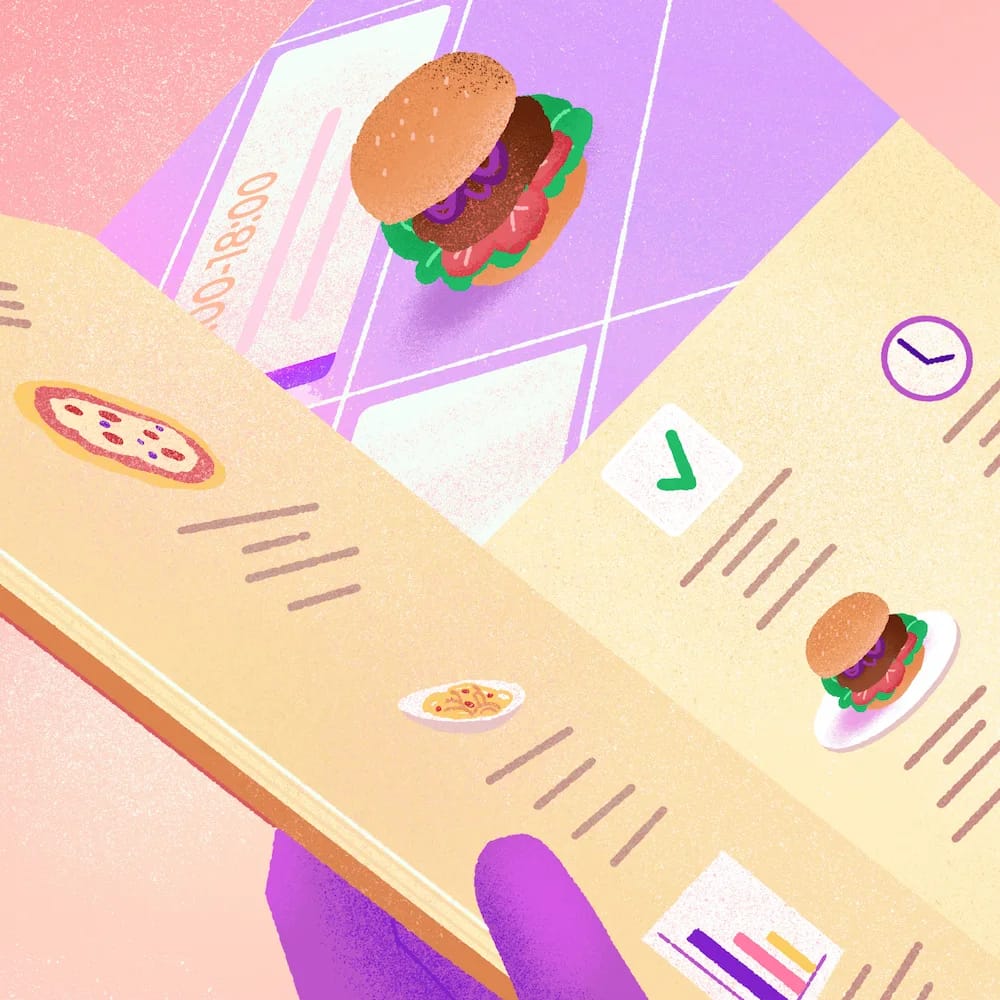Many employers are turning to Facebook Messenger to get in touch with their employees, rather than setting up a business communication tool. Are you one of them?
While this easy option may be quite tempting, it can seriously undermine your employees’ right to disconnect from work as well as their privacy. 🚩
Of course, Facebook Messenger is a handy tool for chatting with friends and family—don’t we all have a family chat? 🙃 But in a work context, given that these chats require either being friends or accepting a chat request from a supervisor, the line between private life and work can quickly get blurred.
This post explains:
- The pros of Facebook Messenger
- The cons and challenges of using this platform for work
- Why a business communication tool is a better alternative
Pros of Facebook Messenger
At Agendrix, one of our core values is no bullshit. This applies across the company, including in our blog. So I’m not going to bury my head in the sand and tell you that Facebook Messenger only has negatives—you know as well as I that this is not true.
Here are 4 advantages that cause employers to end up using this tool to communicate with their employees.
1. Familiarity and accessibility
How many people do you know who don’t use Facebook? Probably not a lot. Because so many people already use this platform for personal applications, its Messenger tool is very familiar to them.
It’s only natural to opt for Messenger for work conversations—sometimes almost unthinkingly, because it’s so easy. The app is already on your smartphone, and you know how to use it.
It’s a free and easily accessible instant messaging tool.
2. Groups and group conversations
Need to share information with everyone on your team? Facebook Messenger lets you create group conversations.
Group members can communicate quickly and share files or documents, such as work schedules and time-off requests.
3. Notifications
Facebook Messenger instant notifications make for fast, real-time communication. This can come in handy when you need to discuss something urgent, such as a replacement when an employee is a no show for their shift.
4. Integration with other interesting features
Other features such as video calls or even Facebook events can be useful for coordinating your work team.
Cons of using Facebook Messenger vs. a business communication tool
Now that we’ve looked at the main advantages of Facebook Messenger, let’s take a look at the downsides.
Here are the 5 biggest cons of this platform when used in a professional context.
1. Confidentiality
Facebook Messenger is owned by Meta, a company that collects people’s personal data for advertising and other purposes.
This can raise concerns about the confidentiality of exchanges and the sensitive business information you share.
Great care must be taken when sharing information and documents. Make sure to follow your company’s privacy policies.
👀 Scenario: Following Mary’s performance evaluation as a cashier at your hardware store, you forgot to mention that you’d like to give her a raise. When you write on Facebook Messenger to tell her about it, she seems taken aback and doesn’t quite understand why you’re talking about her salary. The next day, you realize that you accidentally wrote to the wrong Mary. 😱 Indeed, your team has two Maries: Mary-Ann and Mary.
2. Security
Of course, Facebook has rolled out security measures. Yet your conversations still risk being compromised. And confidential information can be exposed to unauthorized persons or third parties.
👀 Scenario: Jonathan works at your restaurant to pay his way through school. He’s a star waiter, even taking on manager shifts from time to time to help out. You need to get in touch with him on Messenger about a billing problem for a big party. So you write the sales amount and describe the error. What you don’t know is that he hasn’t locked his phone with a code. When the message shows up on his screen, it’s on a table where several students are sitting, and Jonathan is not in the room. As a result, the information is plainly visible to anyone nearby.
Other similar examples might include sensitive data such as social insurance numbers, addresses, specimen cheques or other private information that an employee might share with you via Facebook Messenger. If your personal account gets hacked, all of that data will be compromised.
3. Distractions
Facebook is first and foremost a social network where people share entertaining content. And the platform’s many notifications are a big part of the reason why Facebook is so good at keeping users hooked. 🔔
As a result, using Facebook Messenger for work conversations can cause your employees to check their personal messages while they’re working. All these constant notifications can impact their focus. This kind of distraction can be detrimental to the quality of work and customer service.
4. The overlap between personal and work life
The right to disconnect from work and the protection of privacy cannot be overlooked by employers.
Your employees have a life outside work, and allowing them to take time off only benefits you, since they come back to work fresh and energized for their tasks.
Using Facebook Messenger for work can blur the boundary between personal and work conversations. In addition to causing distraction, this can make your employees feel overworked. They constantly need to be available to answer your questions, whether about the work schedule or a specific task.
👀 Scenario: Andy is a lab technician at your pharmacy. He mentions that he needs a day off next week for a medical appointment, but you can’t find the information—even after checking your Facebook messages, text messages, office post-it notes, and work agenda. So you decide to contact him by Messenger, even though he’s not working today, since you absolutely have to finish the work schedule. What you don’t know is that he’s throwing a birthday party for his daughter, over whom he has joint custody. You’re disrupting a valuable moment in his personal life.
This situation could easily be avoided with a centralized communication tool,
as opposed to a random assortment of communication channels.
5. Limited functionality
Although Facebook Messenger has some interesting features, such as groups, audio messages, video calls and file sharing, it has its limitations. You won’t be able to directly create work schedules, store employee data or even track clocked-in hours, to name just a few examples.
The benefits of a business communication tool
1. Secure employee and company data
If security and confidentiality are major concerns for your company, you have everything to gain by using a business communication tool.
Choose software with enhanced security measures. After all, the data you store and process is likely to be sensitive. So take all necessary steps to keep this information secure.
At Agendrix, for example, we are ISO/IEC 27001:2013 and ISO/IEC 27701:2019 certified. These certifications have two objectives: to improve information security systems and to better handle and manage personal information and sensitive data. So our customers enjoy complete peace of mind—security is a priority and is proactively addressed.
2. Don’t overlook privacy and confidentiality
As we saw in the above scenario, Facebook Messenger isn’t the best tool for data confidentiality. Anyone can gain access to your employees’ phones, and therefore to confidential information.
Business communication tools are specifically designed to meet the confidentiality and compliance standards of their business customers. This considerably reduces the risk of disclosing sensitive information.
3. Benefit from more advanced features
Business communication tools are often more than just a one-off app: they’re part of a HR software package with a host of features that let you centralize everything in one place.
Some HR software packages allow you to:
- Contact your team via private messages or group communications (company-wide or team-specific)
- Centralize and organize your employee records
- Create and share your work schedules
- Get confirmation that a message or schedule was read or received
- Record hours worked and transfer them to your payroll system
- View your team’s time-off requests
- Measure employee satisfaction and opinions through surveys
- Offer peer recognition
- And more
These additional features make business communication tools a more suitable choice for a work context. What’s more, some tools offer integrations with other corporate software, such as payroll processing systems. This in turn simplifies your work processes.
4. Access to tech support
Have you ever tried to reach Facebook Messenger’s customer service? Forget it. More likely than not, you’ve already had to assist an employee who was struggling to understand how to share a file on this platform. Or find a fix for a problem that came up on the platform (perhaps by Googling it).
When you opt for a business communications tool, you get peace of mind, especially when the software comes with dedicated technical support.
Whether you want to take advantage of more advanced features or troubleshoot an employee login glitch, a customer service team is here to help. You are no longer responsible for solving technical problems or answering user questions. Your days of having to cover technical support are over. ☎️
5. Keep a clear separation between personal and work life
Using a business communication tool minimizes any overlap between work and personal life. You no longer need to add your employees as friends on social media in order to communicate with them. Instead, you centralize your communications in a dedicated work tool, to which your employees can connect whenever they like.
The right to disconnect
Your employee need to unplug from work—as do you, for that matter—to come back rested and ready for their shifts. The right to disconnect is a law in France. So join the ranks of caring employers who prioritize their employees’ well-being with tools that don’t infringe on their private lives. 🫶
Wondering how to get started? Have a look at our right-to-disconnect policy template.
Business communication tools: a must for your company and your employees
As you can see, Facebook Messenger has its pros and cons as a communication tool. But at the end of the day, a dedicated business communication tool has so many advantages. You’ll keep your private life separate from work, and your company will enjoy greater credibility with your team.
What is a business communication tool?
A business communication tool is an app or software that facilitates communication at a company. It enables managers and employees to communicate effectively, from a secure location.
Some business communication tools offer a range of features, such as instant messaging, group conversations, audio messages and file sharing. These tools promote organizational productivity, collaboration and efficiency.
Who uses business communication tools?
A variety of companies use business communication tools to facilitate team conversations. Managers can share all information necessary for the business to run smoothly, such as dress-code changes, a new restaurant menu, seasonal promotions, etc. They can also speak privately with their employees about time-off requests, replacements and schedule conflicts.
Sectors and industries that benefit from using a business communication tool include:
- Health care organizations
- Retirement homes
- Emergency services
- Cities and municipalities
- Retail businesses
- Pharmacies
- Restaurants, hotels and bars
What are the benefits of a business communication tool?
The benefits of a business communication tool include:
- Centralized team communications
- Better data security and confidentiality
- More effective collaboration
- Better work-life balance
- Greater respect for employee privacy
- Many additional features








